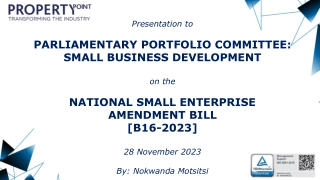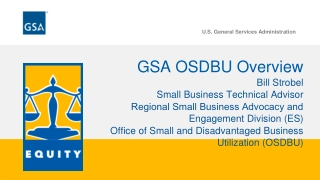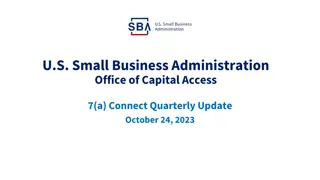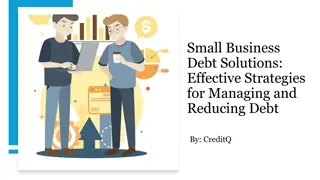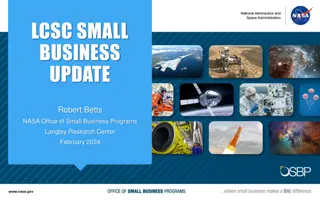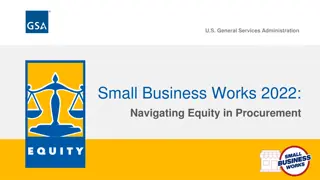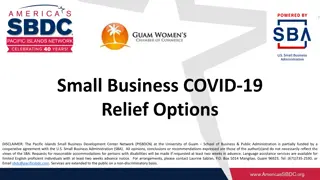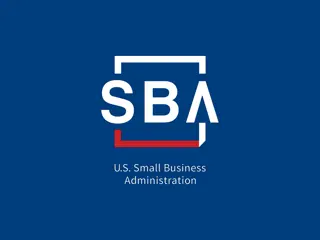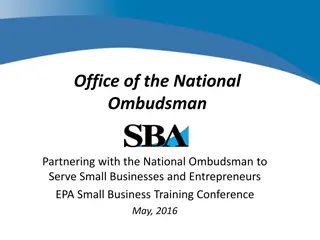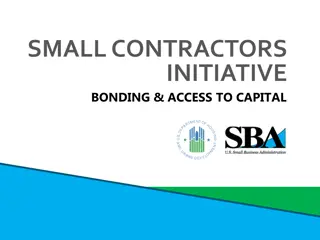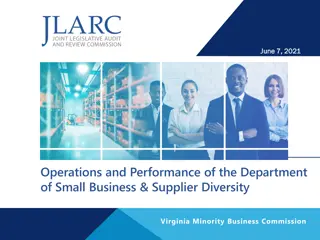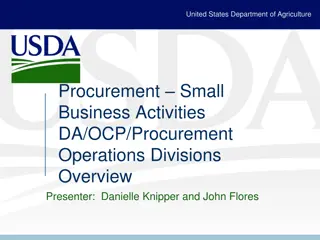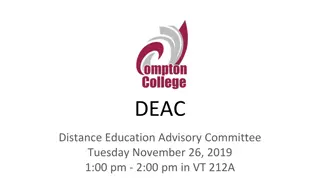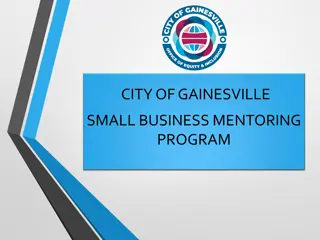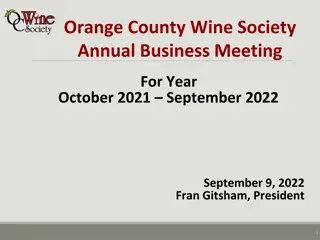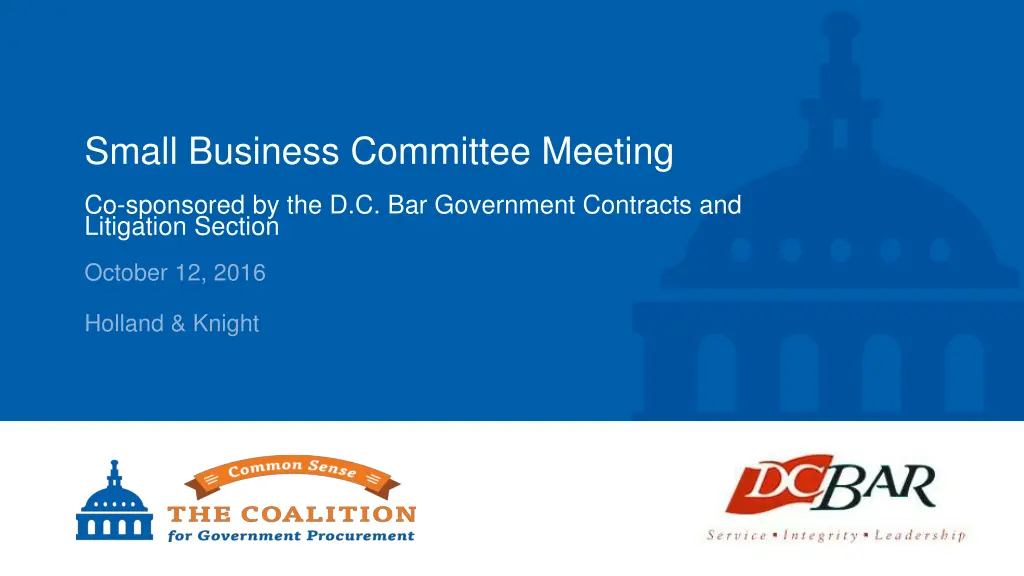
Small Business Committee Meeting Update on Kingdomware Technologies Inc. v. United States
Stay informed about the latest developments in the Kingdomware Technologies Inc. v. United States Supreme Court decision discussed at the Small Business Committee Meeting. Learn about the Rule of Two and its implications for small businesses. Gain insights from guest speakers and explore upcoming events and SBA regulations.
Download Presentation

Please find below an Image/Link to download the presentation.
The content on the website is provided AS IS for your information and personal use only. It may not be sold, licensed, or shared on other websites without obtaining consent from the author. If you encounter any issues during the download, it is possible that the publisher has removed the file from their server.
You are allowed to download the files provided on this website for personal or commercial use, subject to the condition that they are used lawfully. All files are the property of their respective owners.
The content on the website is provided AS IS for your information and personal use only. It may not be sold, licensed, or shared on other websites without obtaining consent from the author.
E N D
Presentation Transcript
Small Business Committee Meeting Co-sponsored by the D.C. Bar Government Contracts and Litigation Section October 12, 2016 Holland & Knight
Agenda 1. Update on Kingdomware Technologies, Inc., v. United States Supreme Court decision- Joe Hornyak, Holland & Knight 2. All Small Mentor Prot g and Kingdomware Update Guest Speakers-Ken Dodds, the Director for the Small Business Administration s (SBA) Office of Policy, Planning, and Liaison; John Klein Associate General Counsel for Procurement Law 3. Other noteworthy SBA regulations or initiatives 4. Upcoming Events Slide 2
Update Kingdomware Technologies, Inc., v. United States Supreme Court decision Joe Hornyak, Holland & Knight
Kindomware Technologies, Inc. v. U.S. Long-running series of GAO and Court of Federal Claims bid protests decided by U.S. Supreme Court on June 16, 2016. The Veterans-specific "Rule of Two" provides that the Department of Veterans Affairs (VA) "shall award contracts" by restricting competition to veteran-owned small businesses if the CO reasonably expects that at least two such businesses will submit offers at a fair and reasonable price. See backup slide. The VA contended that this VA-specific Rule of Two does not apply when procuring supplies or services via the Federal Supply Services (FSS) program (i.e., GSA Schedules contracts). GAO disagreed and ruled that the VA-specific Rule of Two applies to FSS orders; the VA declined to follow GAO. The Courts of Federal Claims and Court of Appeals for the Federal Circuit disagreed with GAO and agreed with the VA. 4
Kindomware Technologies, Inc. v. U.S. (cont.) The Supreme Court rejected the VA's position and overruled the lower courts, finding: The Rule of Two is mandatory even where the Government meets its veteran contracting goals. FSS orders are "contracts" within meaning of 8127(d); the VA-specific Rule of Two applies to FSS orders 5
Kindomware Technologies, Inc. v. U.S. (cont.) On July 25, 2016, the VA issued Acquisition Policy Flash! 16-20 mandating immediate compliance with Kingdomware for all new requirements and even some previously- awarded IDIQ contracts. Broader issues for consideration by SBA from Supreme Court ruling: Does the Small Business Act s Rule of Two apply to FSS orders (contrary to long line of GAO decisions)? See backup slides. 6
Kindomware Technologies, Inc. v. U.S. (cont.) GAO Decisions in Aldevra protest October 16, 2015 GAO Decision: Small Business Act s Rule of Two does not apply to orders under FSS contracts between $3K - $150K. September 27, 2016 GAO Decision: Aldevra s request for reconsideration denied because Kingdomware was not intended to be retroactive. GSA Blog Post July 14, 2016: Kingdomware affects only VA contracting officers; does not require set aside of non-VA FSS orders. 7
Small Business Act, 15 U.S.C. 644: . . . (j) Small business reservation (1) Each contract for the purchase of goods and services that has an anticipated value greater than $2,500 but not greater than $100,000 shall be reserved exclusively for small business concerns unless the contracting officer is unable to obtain offers from two or more small business concerns that are competitive with market prices and are competitive with regard to the quality and delivery of the goods or services being purchased. (Emphasis added) 9
SBA Regulation, 13 C.F.R. 125.2 (f) Contracting Among Small Business Programs (1) Acquisitions Valued At or Below the Simplified Acquisition Threshold. The contracting officer shall set aside any acquisition with an anticipated dollar value exceeding the Micro-purchase Threshold but not exceeding the Simplified Acquisition Threshold (defined in the FAR at 48 CFR 2.101) for small business concerns when there is a reasonable expectation that offers will be obtained from at least two small business concerns that are competitive in terms of quality and delivery and award will be made at fair market prices. This requirement does not preclude a contracting officer from making an award to a small business under the 8(a) BD, HUBZone, SDVO SBC or WOSB Programs. (2) Acquisitions Valued Above the Simplified Acquisition Threshold. (i) The contracting officer shall set aside any acquisition with an anticipated dollar value exceeding the Simplified Acquisition Threshold (defined in the FAR at 48 CFR 2.101) for small business concerns when there is a reasonable expectation that offers will be obtained from at least two small business concerns that are competitive in terms of quality and delivery and award will be made at fair market prices. However, after conducting market research, the contracting officer shall first consider a set- aside or sole source award (if the sole source award is permitted by statute or regulation) under the 8(a) BD, HUBZone, SDVO SBC or WOSB programs before setting aside the requirement as a small business set-aside. There is no order of precedence among the 8(a) BD, HUBZone, SDVO SBC or WOSB programs. 10
Veterans Benefits, Health Care, and Information Technology Act of 2006, 38 U.S.C. 8127 . . . (d) Use of Restricted Competition. Except as provided in subsections (b) and (c), for purposes of meeting the goals under subsection (a), and in accordance with this section, a contracting officer of the Department shall award contracts on the basis of competition restricted to small business concerns owned and controlled by veterans if the contracting officer has a reasonable expectation that two or more small business concerns owned and controlled by veterans will submit offers and that the award can be made at a fair and reasonable price that offers best value to the United States. (Emphasis added) 11
Ken Dodds, the Director for the Small Business Administration s (SBA) Office of Policy, Planning, and Liaison John Klein Associate General Counsel for Procurement Law, SBA
Kenneth Dodds Director, Office of Policy, Planning & Liaison Small Business Administration October, 2016
One for 8(a) BD and One for All Other Small Businesses Joint Venture Agreement must be in Writing Joint Venture may not be populated (except for administrative personnel) Joint Venture must be separately identified in SAM as JV All Mentor Prot g s will be Approved by the Office of Business Development Joint Venture must certify it will comply with performance requirements, and report to SBA and the CO on performance
Change from mentor must have good financial condition to Mentor must demonstrate that it can fulfill its mentor prot g obligations Mentor can have up to 3 proteges total at any one time Small business may be both a prot g and a mentor at the same time Proteges must qualify as small for primary NAICS or secondary NAICS applies to 8(a) Prot g may have up to 2 mentors in its lifetime in any program
SBA will not verify small business or socioeconomic status may be protested 8(a) mentor/prot g may notify SBA that it is transferring relationship to small MP relationship after graduation Project manager does not need to be employee of the firm at time of offer, but need letter of intent. Cannot be former employee of the mentor. Mentors will not be required to divest at end of relationship
Three years, with three year extension, but reviewed annually to ensure prot g is receiving identified assistance and contracts are being properly performed by appropriate parties Past performance and experience of JV members or subs must be considered by the CO Prot g must identify all other mentor prot g relationships At the conclusion of a relationship, prot g must report on whether it benefitted
Protg must perform 40% of work performed by JV, and 40% of aggregate performed by members of the JV at any tier All Mentors must be for-profit HUBZone JV rules align with other programs Applicants may request reconsideration of denial
Mentor that fails to provide assistance: may result in termination of the agreement; mentor prohibited from acting as mentor for two years; SBA may request for agency to stop work and/or allow prot g to perform May be grounds for debarment
Mentor may transfer relationship to purchaser Size of an approved 8(a) JV may be protested SBA s set aside programs are available outside the U.S. 8(a) Social Disadvantage provide facts or evidence to support claims of negative impact 8(a) control managerial experience need not be in same or similar industry
8(a) Application Tax forms not required but may be requested Wet signature not required Not all past convictions will be submitted to OIG Economic disadvantage narrative not required Dominance of Entity owned concerns SBA will compare firm s share compared to overall small business share at a national, 6 digit NAICS level Entity owned concerns individual may manage only 2 Participants
Members or directors of NHO need not have the technical expertise or license, but must have managerial experience needed to run concern NHO establish economic disadvantage based on status of Native Hawaiians, not managers. Once established, will not be required for second NHO unless intent is to serve a different population Sole Source awards to Entity Owned Concerns above $22 million CO must provide justification with offering letter Changes to Primary NAICS codes for entity owned concerns Concern will have an opportunity to provide explanation. Second firm with identical NAICS code may not be allowed to receive any more contracts in that code 8(a) firm may request suspension in the case of a disaster or government shutdown
Entity Owned Benefits Reporting Align with Entitys Fiscal Year, not annual review Reverse Auctions Small business rules apply, such as the rule of two and requirement for a Certificate of Competency SBA may request reconsideration in any OHA proceeding
Mentor Protg programs of other agencies Within one year of August 24, 2016, the head of an agency must submit a plan for any program the agency seeks to continue Does not apply to DoD 81 FR 48558 (July 25, 2016, effective August 24, 2016)
Kenneth Dodds Director, Office of Policy, Planning & Liaison 202-619-1766 kenneth.dodds@sba.gov John Klein Associate General Counsel for Procurement Law 202-619-1776 John.klein@sba.gov
Upcoming Events Demonstration of GSA s Data2Decisions tool; guest speaker Josh Royko October 19, 2016, 10:00am to 12:00pm at Northrop Grumman RSVP to Jason Baccus Winning GWACs, IDIQs, and Task Orders for Federal Contractors October 27, 2016, 8:30am to 4:00pm at the Tower Club Co-sponsored with the Lohfeld Group EIP Awards Dinner & Fall Conference at the Tysons Corner Westin November 16, 2016: EIP Awards from 6:00pm to 10:00pm November 17, 2016: Fall Training Conference from 8:00am to 6:00pm Nominate an EIP Award Recipient by Friday, October 14 Slide 28

